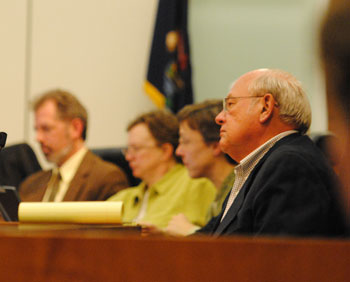Beyond Pot: Development, Liquor, Parks
Ann Arbor city council meeting (March 7, 2011) Part 1: The city council’s Monday meeting lasted nearly until midnight, with most of the five hours devoted to discussion of a proposed medical marijuana ordinance, which the council ultimately elected to postpone. The meeting included other significant business as well, and Part 1 of this meeting report is devoted to just those non-marijuana-related business items.

At the March 7, 2011 city council meeting, Tony Derezinski (Ward 2) was appointed as a hearing officer to consider appeals of recommendations to revoke liquor licenses. To Derezinski's right are Margie Teall (Ward 4), Sandi Smith (Ward 1) and Stephen Kunselman (Ward 3). (Photos by the writer.)
Also postponed – until the council’s first meeting in April – was a resolution that would outline a way for the Ann Arbor Downtown Development Authority to lead the process of transforming surface parking lots currently owned by the city of Ann Arbor to alternate uses.
The resolution, which articulates the so-called “parcel-by-parcel plan,” had already been postponed once before. In explaining the rationale for the postponement, Christopher Taylor (Ward 3) cited the desire of the DDA to ensconce the parcel-by-parcel plan in a contractually binding agreement, which he said had not been previously indicated.
Not postponed was a vote on appointing a hearing officer for appeals of recommendations that liquor licenses not be renewed. The original resolution was to appoint the members of the council’s liquor license review committee to a hearing board, but it was amended at the table – to the surprise of some councilmembers – to allow for appointment of just one hearing officer: Tony Derezinski (Ward 2). Derezinski also serves on the liquor license review committee. Voting against the amendment, as well as the final appointment, were three councilmembers, including Stephen Rapundalo (Ward 2). Rapundalo chairs the council’s liquor license committee and has served on it since it became a permanent council committee in 2008, as well as before that, when it was an ad-hoc committee.
The council also approved the city’s Parks and Recreation Open Space (PROS) plan – an inventory, needs assessment and action plan for the city’s parks system, which is required by the state for certain grant applications. The deadline faced by the council to renew the five-year plan was April 1, 2011.
In other non-marijuana business, the council approved a “complete streets” policy, authorized a stormwater study in the Swift Run drain system, established a loan loss fund for the Property Assessed Clean Energy (PACE) program, and authorized the purchase of LED streetlight fixtures.
The council also heard its usual range of public commentary and communications from its own members. A public hearing was held on the establishment of a Washtenaw Avenue corridor improvement authority (CIA), during which Ypsilanti mayor Paul Schreiber spoke. The Chronicle will cover the mayor’s comments as part of a future report on a CIA public meeting conducted by city planning staff. [Full Story]



